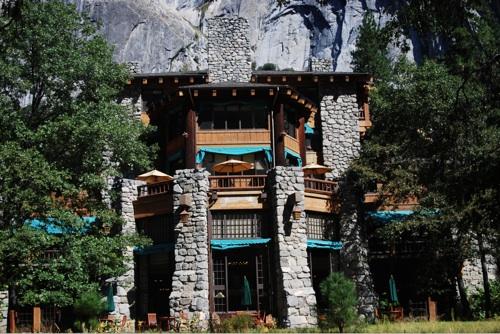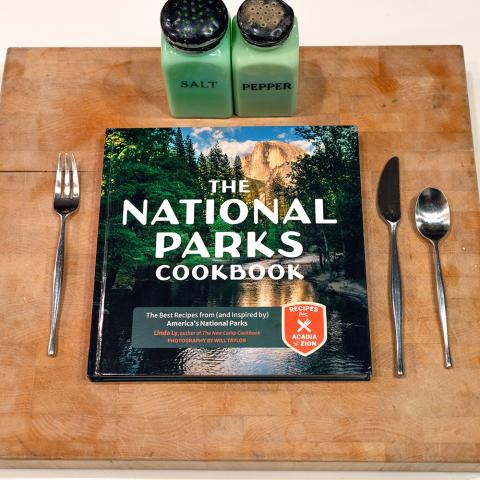
A multi-million-dollar claims has been filed by DNC Parks & Resorts at Yosemite over its "intangible" property in Yosemite National Park, including trademarks to places such as The Ahwahnee Hotel/Kurt Repanshek
A multi-million-dollar lawsuit has been filed against the federal government by DNC Parks & Resorts at Yosemite, which claims the National Park Service breached its contract with the concessionaire.
The lawsuit, filed in the U.S. Court of Federal Claims in Washington, D.C., seeks more than $10 million in damages. It is only the latest twist in the business of operating concessions in the National Park System. In the past year there has been a lawsuit filed against the Park Service for the way it severed concessions contracts at Grand Canyon National Park, battles over trademarks to place names in Grand Canyon, and now a claim over the loss of the most lucrative concessions contract in the park system.
The 10-page filing on behalf of DNC Parks & Resorts, a subsidiary of Delaware North Parks & Resorts, Inc., alleges breach of contract by the Park Service for its failure to require Yosemite Hospitality, LLC, to purchase DNC's intangible properties when it won the Yosemite National Park concessions contract earlier this year. Specifically, DNC had sought $51 million for that property, which included a customer database with more than 720,000 names and "75 different informational fields," domain names and websites, as well as the rights to trademarks it holds to such place names as The Ahwahnee, Badger Pass, Curry Village, and the Wawona Hotel.
Late last year the Park Service in Yosemite valued that intangible property at $3.5 million in a prospectus for the park's concessions business. At the same time, the Park Service said the company that won the concessions contract, if not DNC Parks & Resorts, could rename buildings in the park rather than pay DNC Parks & Resorts to obtain the trademarks.
Soon after Yosemite Hospitality, a subsidiary of Aramark, another large park concessions company, was awarded the contract over DNC Parks & Resorts, Aramark officials told the Traveler that they were in negotiations to continue to use the historic names associated with Yosemite businesses.
"Specific details about our plans for Yosemite will be announced over the next few months, however, our goal is to elevate the guest and visitor experience by introducing new offerings, upgrading amenities and enhancing existing programs," David Freireich, a company spokesman, wrote in an email. "As for the trademark question, we’ll be working with the various parties to address this as part of the transition."
Mr. Freireich did not immediately respond Thursday to a phone call seeking an update on those negotiations.
Still, DNC Park & Resorts' claim for damages could hinge in large part on a provision in the U.S. Code that specifically gives the National Park Service the right to "retain the name historically associated with the building or structure" regardless of any trademark.
Sec. 302106. Retention of name
Notwithstanding section 43(c) of the Act of July 5, 1946 (known as the Trademark Act of 1946) (15 U.S.C. 1125(c)), buildings and structures on or eligible for inclusion on the National Register (either individually or as part of a historic district), or designated as an individual landmark or as a contributing building in a historic district by a unit of State or local government, may retain the name historically associated with the building or structure.
In Yosemite, there are more than 40 historic properties comprising sites, objects, buildings, and districts listed in the National Register of Historic Places. The park is also home to five National Historic Landmarks: The Ahwahnee Hotel, Le Conte Memorial Lodge, Parsons Memorial Lodge, the Rangers' Club and the Wawona Hotel & Thomas Hill Studio District.
Trademark issues also surfaced at Grand Canyon National Park last year when Xanterra Parks & Resorts, at the time in negotiations to win a long-term contract for concessions on the park's South Rim, applied for trademarks for most business names on the South Rim, including the El Tovar Hotel, the Bright Angel Lodge, the Buckey O'Neill Cabin, Lookout Studio, Hopi House, the Kolb Brothers Studio, the Grand Canyon Depot, Phantom Ranch, and the Grand Canyon Railway.
But the Park Service pushed back. In January, the agency notified Xanterra by letter that it "considers the marks in use by Xanterra as property of the Service protected pursuant to common trademark law rights. The Service asserted it has exclusively and continuously controlled the marks, and in particular retains control of the nature and quality of provided goods and services through operation of concessions contracts with providers of goods and services such as Xanterra.
"The Service further claimed Xanterra's use of the claimed marks is solely by virtue of concessions contracts through which the Service ultimately controls the nature and quality of the provided goods and services."
The Park Service in that January 12 letter also asked the concessionaire to abandon its bid to obtain the trademarks. In March, Xanterra did just that.




 Support Essential Coverage of Essential Places
Support Essential Coverage of Essential Places







Comments
Now you see what I miss about the railroads. They had class.
I really hope DNC improves it concessions in Yosemite. It is one of the few weak spots at Yosemite
Considering what a wreck DNC has made of the concessions at Yosemite (I have *never* seen such dirty bathrooms as I have at Curry Village, among many other issues), their executives deserve to be laughed out of court. Then they need to be fined in the millions.
Yes, this is a moral and ethical opinion, not a legal one.
Al, I wonder sometimes whether or not our recollections of things in our past aren't influenced by rose colored glasses. I understand that you are a very strong supporter of the railroads and their role in advocating the development of national parks as tourist destinations. In my early teens, I too often preferred to ride the trains whenever possible. But I recall that Southern Pacific didn't really want to continue passenger service. They were forced to provide passenger service by Congress, despite diminishing revenues. The result was that passenger trains were often woefully late in arriving at their destination, and it seemed to me that the railroads hired the meanest conductors imaginable to encourage the eventual demise of Congressionally mandated railroad passenger service. When I worked as a park ranger naturalist at Zion (1969), the park concession was run by Union Pacific. They also operated at the North Rim, and perhaps Bryce Canyon and Yellowstone. I cannot recall that the service provided was particularly exceptional.
Any concessionaire's attempt to trademark place names in a national park is ridiculous, especially when those place names preceded their contract. Greed, pure and simple.
I think the NPS does such a poor job managing our public land that it should lose the privilege of managing them. I think the DNC, Xanterra or Aramark should be sub-contracted to run all Park operations. The NPS has already ruined Yosemite and Yellowstone. The accountability required by the Private-sector far surpasses the complacency and ineptitude of the Public-sector. I would, also, find it acceptable if the NPS was folded into the BLM or NFS. This is just my feelings about the NPS. The NPS has for too-long been permitted to ride the coat-tails of the grandeur of the land they manage.
Matt - while there are many areas where those private companies can do a better job than public ones - concessions, hotels, et al. I don't think the primary mission - preservation - would be well served by the profit motive.
I agree EC, on the issue of railroads, I think they made some significant contributions to our first National Parks, the nation as whole for that matter. I know the President of the Southern Pacific was extremely instrumental in getting the California State Senate to cede the Yosemite Valley/Mariposa Grove grant to the Federal Government (do I have that right Alfred?). But from my own less than expert knowledge of US history, the railroads also became the first mega monopolies, some shady deeds were done by them, short haul rates,, political corruption, well you all the know the history as well as I. The railroads also got some sweetheart deals from the feds, including millions of acres of undeveloped lands, subsidies, land swaps that tied up some crucial water rights, there was a dark side. I do think rail could play an important part in transportation issues in some of our park areas, I think Alfred is right about that. Thanks for the informative post Traveler, got off subject but interesting comments.